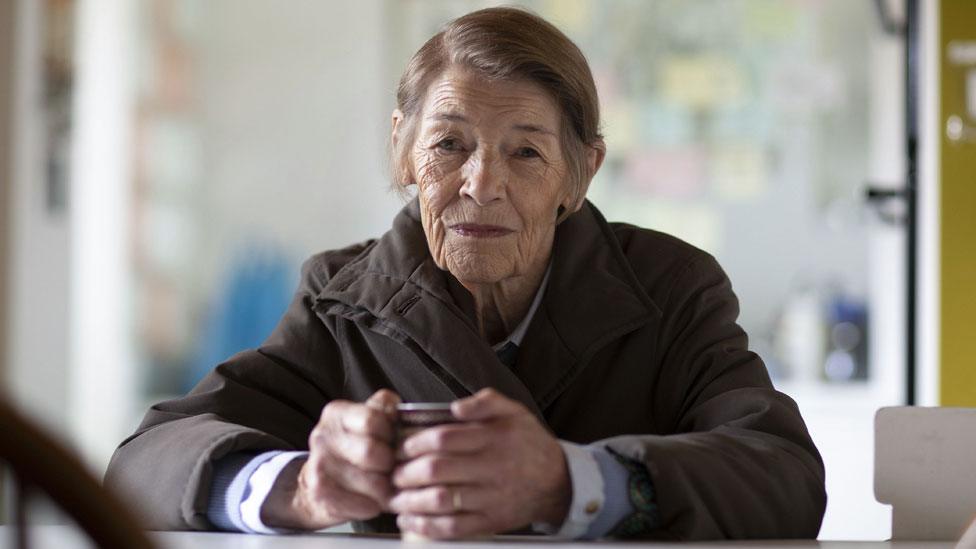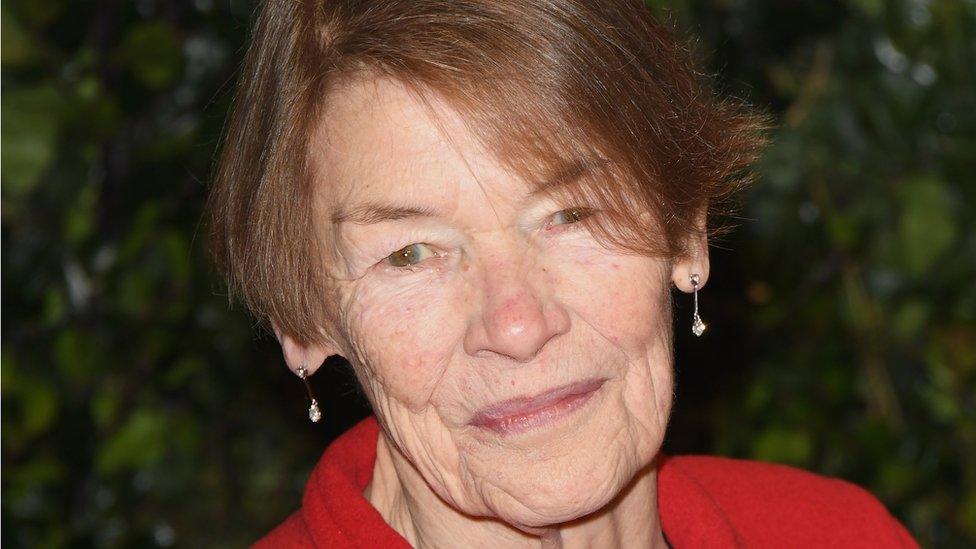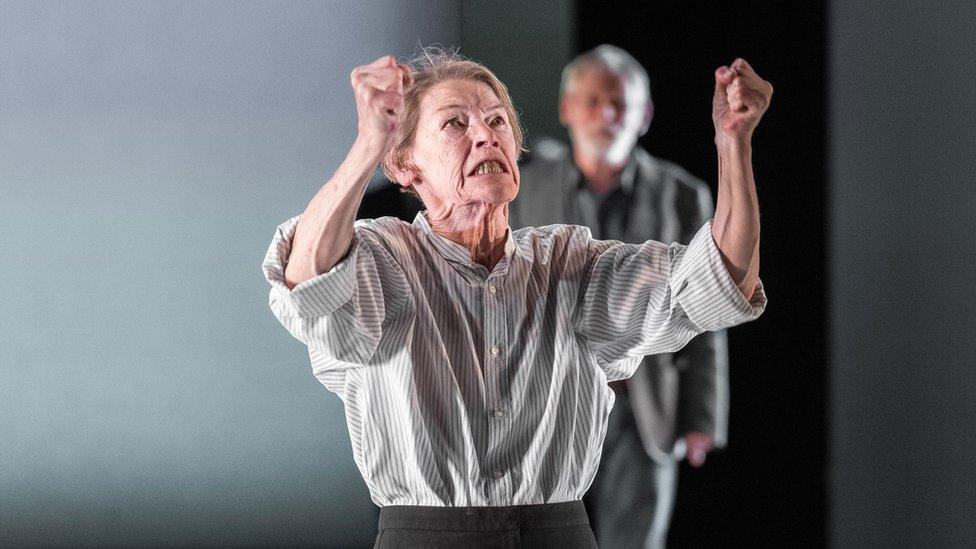Glenda Jackson 'shines' on TV return
- Published

Glenda Jackson plays Maud, who has Alzheimer's and is determined to discover what has happened to her friend Elizabeth, who has suddenly disappeared.
Glenda Jackson has been praised on her TV return after 27 years away, for playing a woman with dementia in the BBC One drama Elizabeth Is Missing.
Jackson stepped away from acting in 1992 to pursue a career in politics, becoming a Labour MP, retiring in 2015.
She returned to acting not long after and now her television comeback has received glowing reviews.
It shows Jackson's character Maude, battling Alzheimer's disease while searching for her friend Elizabeth.
Dementia: The greatest health challenge of our time
Alzheimer's disease is the cause of 60-70% of dementia cases.
The Guardian, external gave the murder mystery drama the full five stars: "Glenda Jackson shines in this heartrending whodunnit".
"The actor is on magnificent form in a poignant murder mystery that doubles as a study of the sorrows of dementia" wrote Lucy Mangan.
The Telegraph, external declared: "Glenda Jackson is on award-winning form in this unforgettable dementia drama."
Anita Singh wrote: "If you are an actress hoping to win a Bafta in February, and your name is not Glenda Jackson, I regret to inform you that this is not your year. In Elizabeth Is Missing, Jackson gave one of the performances of her lifetime."
'No airbrushing'
The 83-year-old previously won two best actress Oscar trophies for her lead roles in 1969 film Women in Love and 1973's A Touch of Class.
Having returned to acting in 2015 in the Radio 4 play Blood, Sex and Money, before performing the title role in William Shakespeare's King Lear at the Old Vic the following year, Jackson's TV return in the adaptation of Emma Healey's best-selling novel has garnered more critical acclaim.
The Times, external said there were was "no airbrushing of Alzheimer's in this tough tale".
"Glenda Jackson might have retired from acting to join that other type of showbusiness for ugly people, but that 23-year career break hasn't withered her talent," penned Carol Midgley.
Allow YouTube content?
This article contains content provided by Google YouTube. We ask for your permission before anything is loaded, as they may be using cookies and other technologies. You may want to read Google’s cookie policy, external and privacy policy, external before accepting. To view this content choose ‘accept and continue’.


Director Aisling Walsh on working with Glenda Jackson on Elizabeth is Missing
The first thing we were both concerned about having studied the script was creating a timeline. How long things were apart. How long is it after Glenda's character gets locked into her home and before she moves to her daughter's house?
So we created a chronological order for the entire film, both in the present and in the past.
Quite early on we met with a wonderful doctor from Dementia UK and she helped us greatly; answering our questions about details of the illness that were described in our script, and that Glenda would have to act out. The frustration, the violent episodes.
We had a week to rehearse. I took Glenda to her character's home on the first day of rehearsals. We wandered around the house so we could both get a good feel for it.
I wanted her to see the scale and get a sense of the life Maud lived… how we were going to portray that in the film. I then took her to Elizabeth's home so she could get a sense of that place, too.
We then talked about the story, how neither of us wanted Glenda 'to play' the illness. We decided in Maud's world, and in her head, that she's sane, her only problem is that no-one is listening to her.
We spent some time with Liv Hill (playing the young Maud), and of course with Sophie Rundle and Mark Stanley (who played Sukey and Frank). We had to see the adoration Maud had for Sukey and Frank.
When filming we'd walk through a scene… find our way… get comfortable with it all and then set up and start shooting. Sometimes we would alter tiny moments.
Glenda might have an idea about how she wanted to do something, always wanting to make it better, more believable. It was amazing every day on the set to watch her portray this wonderful character.

There was also an outpouring of praise online, with Royal commentator Dickie Arbiter calling Jackson's performance "stunning and moving".
Another Twitter user was brought to tears on Sunday evening.
Allow X content?
This article contains content provided by X. We ask for your permission before anything is loaded, as they may be using cookies and other technologies. You may want to read X’s cookie policy, external and privacy policy, external before accepting. To view this content choose ‘accept and continue’.

Allow X content?
This article contains content provided by X. We ask for your permission before anything is loaded, as they may be using cookies and other technologies. You may want to read X’s cookie policy, external and privacy policy, external before accepting. To view this content choose ‘accept and continue’.

Catherine Kelliher described the feature as "difficult but essential viewing", while Hannah Williams felt her performance was "so absolutely convincing".
Allow X content?
This article contains content provided by X. We ask for your permission before anything is loaded, as they may be using cookies and other technologies. You may want to read X’s cookie policy, external and privacy policy, external before accepting. To view this content choose ‘accept and continue’.

Allow X content?
This article contains content provided by X. We ask for your permission before anything is loaded, as they may be using cookies and other technologies. You may want to read X’s cookie policy, external and privacy policy, external before accepting. To view this content choose ‘accept and continue’.

Others noted how the at-times confusing programme perfectly encapsulated the exasperation of dementia.
And actor Gavin Mitchell described the veteran actor's portrayal of Maud as "mindblowingly brilliant".
Allow X content?
This article contains content provided by X. We ask for your permission before anything is loaded, as they may be using cookies and other technologies. You may want to read X’s cookie policy, external and privacy policy, external before accepting. To view this content choose ‘accept and continue’.

Allow X content?
This article contains content provided by X. We ask for your permission before anything is loaded, as they may be using cookies and other technologies. You may want to read X’s cookie policy, external and privacy policy, external before accepting. To view this content choose ‘accept and continue’.

Jackson may have drawn on her experiences visiting elderly people in care homes and day centres when she was an MP for her compelling performance.
She recalls witnessing the strain that these "terrible illnesses" can bring on everyone involved, and also said she consulted a doctor who works with UK charity, Dementia UK, in order to prepare for the role.
'Frustration'
"I said to her: 'What is it that causes this woman [Maud] who, in her pre-illness life, is living seemingly quite roundly, and suddenly there are these excessive outbursts of rage?'"
"The doctor said: 'It's frustration'. Which she actually says in the script: 'I've got all these feelings, but I can't let them out'."
Elizabeth is Missing is available now via the BBC iPlayer.

Follow us on Facebook, external, or on Twitter @BBCNewsEnts, external. If you have a story suggestion email entertainment.news@bbc.co.uk, external.
- Published4 December 2017

- Published5 November 2016
